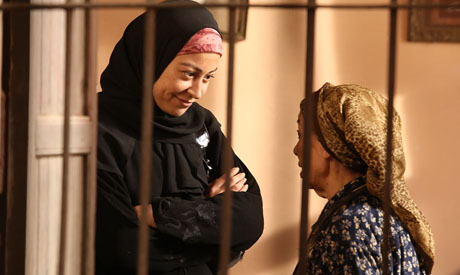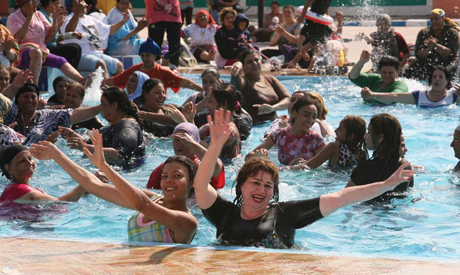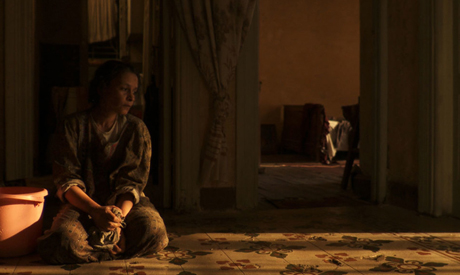Under the title, “Women’s Revolution in Egyptian Cinema”, the 34th Mostra De Valencia, Cinema del Mediterrani or Valencia Film Festival for Mediterranean Cinema (24 October-3 November) is hosting 11 films by nine Egyptian female directors in 2002-2018 in a special retrospective programme.
The films are: Hala Khalil’s Kas Wa Lask (Cut and Paste, 2006) and Nawara (2015); Kamla Abu Zekry’s Wahed-Sefr (One-Zero, 2009) and Yom Lel-Sitat (A Day For Women, 2018); Nadine Khan’s Harag Wa Marag (Chaos, Disorder, 2012); Mariam Abou Ouf’s Bebo and Bashir (2011); Ayten Amin’s Villa 69 (2013); Hala Lotfy’s AL-Khoroug Lel-Nahra (Coming Forth By Day, 2012); Amal Ramsis’s You Come from Far Away (2018); Marianne Khoury’s Women Who Loved Cinema (2002); and Tamantasher Yom (18 Days, 2011), a collaborative film in which both Abou Ouf and Abu Zekry took part alongside eight other directors. Ramsis’s and Khoury’s films are the only two documentaries. The programme includes a round table with the filmmakers moderated by Awatef Ketiti, a University of Valencia gender policies professor.

Although it is the 34th round of the festival, this is the second edition after a six-year hiatus that started in 2012. According to the artistic director Eduardo Guillot during a recent visit to Cairo to promote the festival, in the festival’s newly regained Mediterranean focus, the cinema of the South has its valuable space: “One of the reasons the festival suspended its activities was confusion in its identity leading it away from its mission to promote the Mediterranean cinema. But since the last round in 2018, the festival’s revival has recognized that its Mediterranean identity not only sets it apart from Spain’s many other film festivals in Spain but also promotes cultural dialogue that we are in need of between North and South”. All 11 films are having their Spanish premiere at the festival. “It means that despite all the film festivals we have in Spain opportunities for screening Arab and Egyptian films either in festivals or in film theaters remain very limited.”

A Day For Women
In the 2018 round the festival hosted a retrospective programme of Palestinian long narrative films. “Long narrative filmmaking is demanding and making them in a way proves that there is a real film industry in a country even if an emerging one compared to documentary films which can be made on a smaller budget with lower technical requirements.” This year the focus is on a different fight: “Every female director in a male dominated atmosphere ruled by male logic is a fighter. But they prove that they can produce beautiful films some of which compete at the box office. They also challenge the stereotypical idea of what a female filmmaker can do in terms of style or content. And above all their movies are very interesting. Their stories can happen everywhere but at the same time they are very Egyptian movies.”
The only Egyptian film in the official competition of the festival is Anas Tolba’s Between Two Seas (2018), which though not made by a woman reveals interesting facts about female conditions in some Egyptian contexts. “These movies invite our audience to question a different culture and to interact with the questions suggested in these films,” Guillot says. “This what is called cultural dialogue.” Other Arab films in the official competition are Fatwa (2018) by the Tunisian filmmaker Mahmoud Ben Mahmoud, and The Day I Lost My Shadow (2018) by the Syrian filmmaker Soudade Kaadan. There are five other Arab films in the Informative Section out of competition including the Egyptian film Diamond Dust (2018) by Marwan Hamed, LA GUÉRISSEUSE (2018) by the Moroccan director Mohamed Zineddaine, Are You Glad I’m Here (2018) by the Lebanese director Noor Gharzeddine, Freedom Fields (2018) by the Libyan director Naziha Arebi and Mafak (2018) by the Palestinian director Bassam Jarbawi.

Coming Forth By Day
One of the main aims of the festival after its revival is to establish strong links with Arab cinema: “We want to pay attention to what is happening in North Africa and the Southern Mediterranean countries. So far when we think about cinema in the Mediterranean everyone thinks about France, Italy, Greece, Spain, although Arab films are now in every prestigious international film festival all over the world.” Another reason to pay attention to southern cinema is that in Spain 95 percent of the movies in film theaters are North American films. “A film festival like this has to give precedence to what is happening in other parts of the world. we need to show our audience different cultures, different languages, and different ways of thinking especially when this can happen through quality Arab films which one can see in Berlin, Cannes, and Venice.”
The festival this year also honours Spanish filmmaker Antoni Pérez Canet (Toni Canet), Turkish-Italian filmmaker and screenwriter Ferzan Özpetek and Italian filmmaker screenwriter Liliana Cavani, with special programmes for each as well as a programme of Golden Age Italian Comedy films by such directors as Federico Fellini, Roberto Rossellini, Dino Risi, Mario Monicelli, Nanny Loy, Luigi Zampa and Pier Paolo Pasolini.
*A version of this article appears in print in the 24 October, 2019 edition of Al-Ahram Weekly.
Short link: